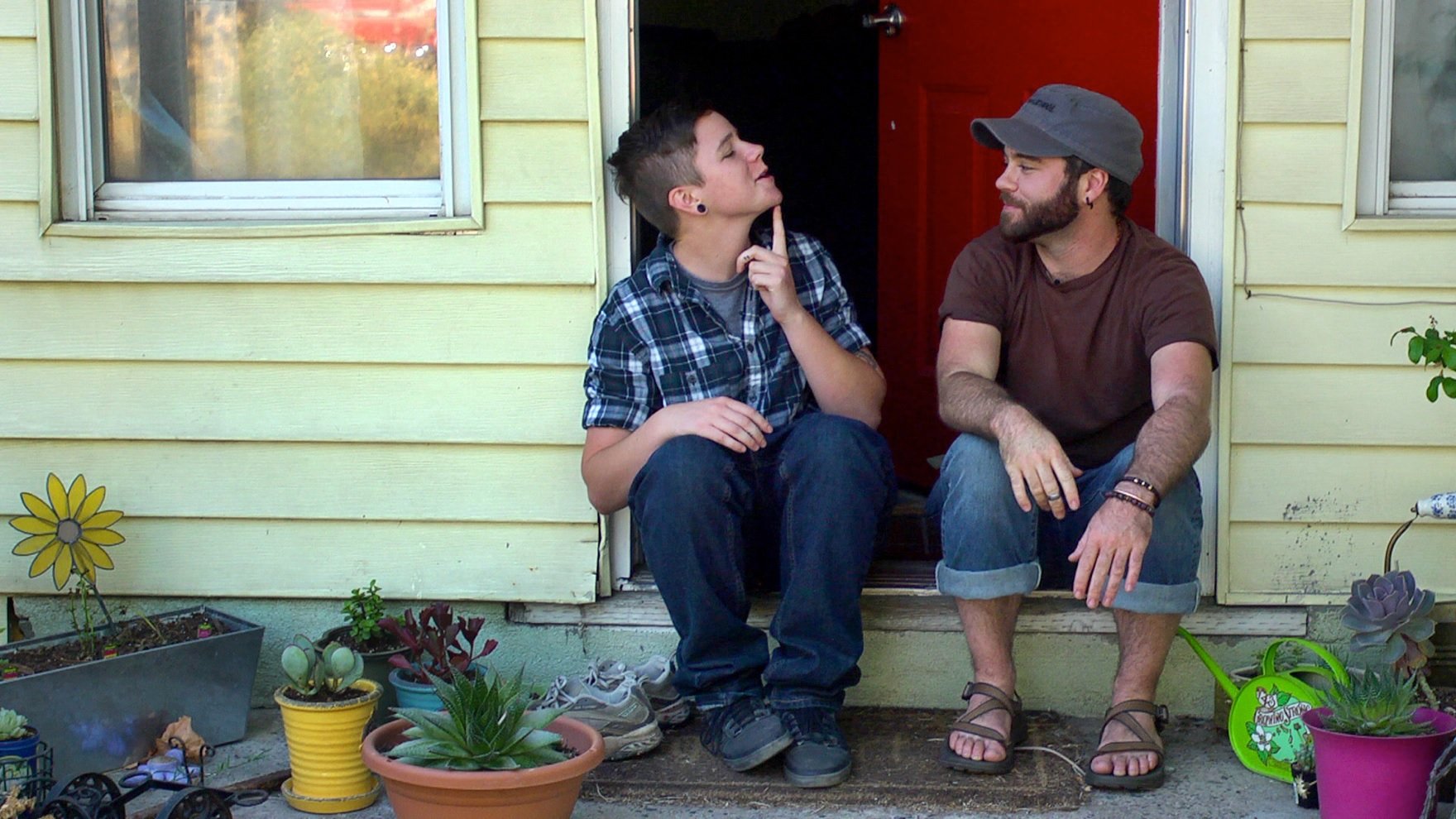Friends, Family and Folk Music | An Interview with Real Boy Director Shaleece Haas
The GAZE Film Festival has come and gone, showcasing once more the best in LGBTQ+ cinema on both international and indigenous fronts. Audiences were entertained, educated, stunned and most importantly, enlightened by the frank and unflinching portrayals of a worldwide LGBTQ+ culture. Although there were many films of great merit – including Edmund Lynch’s A Different Country, a much-needed and greatly-appreciated portrait of gay Ireland prior to decriminalisation, Viva, Paddy Breathnach’s new film about a Cuban drag queen and his estranged father, and Holding The Man, an adaptation of Timothy Conigrave’s seminal 1995 memoir – one film stood out to me among the rest.
Real Boy, Shaleece Haas’ documentary about a young trans musician, is sweet and occasionally hard-hitting, offering viewers a multifaceted coming-of-age narrative that never succumbs to sensationalism. Speaking to me after what must have been an exhausting post-screening question-and-answer session, Haas explains her aims in making such a film and how she hopes to reach audiences with its narrative.
A co-producer of 2013’s The Genius of Marian, producer of short films like 2012’s Awardwinninggir and 2011’s City Fish, and director of the documentary short Old People Driving – which won best documentary at the Phoenix Film Festival in 2010 – Haas is no stranger to the small and silver screens. Filmed over a period of four years, her latest piece focuses on Bennett Wallace, whom Haas met at a small concert: “I was at a living room concert Joe [Stevens] was playing at […] and Bennett opened that show.”

Bennett and Joe’s friendship is central to the film and takes the shape of something akin to a mentor-pupil dynamic; Joe is shown in one scene teaching Bennett how to trim a beard. The film endeavours to highlight how the pair are linked by similar life experiences, as Haas now reiterates to me: “[Bennett] had met Joe at a conference for sober young people. They just struck up a very immediate friendship because of very similar experiences of addiction, of being trans, of their love of music […] Joe very quickly saw Bennett as a younger version of himself that he could support […] and Bennett idolised Joe at that point and saw in him the hope that his voice was going to turn out okay.” She adds: “not everybody has a mentor like that, it’s so valuable.”
Indeed, the text is a multifaceted one, simultaneously dealing with issues of family, friendship and, most upsettingly, addiction. Although the film maintains a kindly tone for its duration, there are intermittent reminders of the struggles many LGBTQ+ people face worldwide, and they come fast and strong. Indeed, queer communities have higher rates of substance abuse and mental health problems than their straight, cisgender contemporaries – writer Matthew Todd claims this is the result of living in a ‘cultural straitjacket’ that forces us to adhere to heteronormative society. Although other films at the festival deal with such issues in more overt ways, their inclusion in Real Boy acts as a small sobering reminder of the societal pressures placed on LGBTQ+ people.
It must be stressed, however, that the ‘cultural straitjacket’ forced upon LGBTQ+ is not unrelenting, and can be loosened. Case in point: Bennett’s mother, a key figure in the narrative, is at first sceptical of her son’s transition. Eventually, over the course of the film’s events, we see her gradually move from a place of ignorance to one of acceptance. In one of the film’s more touching sequences, Bennett sings to his mother a song that encapsulates their journey titled ‘For My Family,’ which goes “Mama, I’m sorry / I didn’t mean to make your cry / I’ve been trying to say hello / You thought I was saying goodbye.”
Of this inspiring transformation, Haas notes: “This is not about Bennett’s gender journey. If anything, Bennett’s journey is one from adolescence to young adulthood. The person who makes the greatest transformation is his mother, who has a longer journey to take from shame and loss and confusion and ignorance, really, to a place where she can embrace and celebrate her son.”

The process of learning undertaken by Bennett’s mother is one that some viewers of the film seem to relate to, as Haas explains: “there was an older lesbian woman [at the GAZE Q&A] who said, ‘I have a lot of trouble with with trans issues, and it’s something that challenges me and I don’t feel that I really understand, and this film made me see something and think about something and feel something that shifted that.’ There’s nothing more gratifying to a filmmaker […] because we don’t move the needle on more equity, more justice or acceptance until we can identify with people who are different for us.”
Haas is quick to note there is more than one target audience for the film, explaining that in the very same screening a young trans man claimed the documentary very closely represented his experience of transitioning: “so to me that is extraordinarily gratifying to say that I’m able to speak to both of those audiences.” The questions of family and relationships addressed in the film will also strike a chord with a multitude of people. Often queer-identifying persons must find chosen families in cases where they are rejected by their family of origin. Did Haas find speaking to multiple audiences a daunting task? “I wanted the film to be accessible to a lot of audiences, to be something that is embraced by my community of queer and trans people. It wasn’t elementary, it wasn’t rudimentary, but it also reached broad audiences, not from a place of curiosity or interest in what ‘those’ lives are like, but from a place of identification. To tell a story about family and a desire to be loved by family, that was important to us.”
There is a lack of trans representation in media, and when trans people are featured in interview scenarios they are sometimes mocked and degraded: in a 2014 interview with Katie Couric, Orange is the New Black star Laverne Cox endured offensive questions relating to her transition, to which she gracefully responded, “the preoccupation with transition and surgery objectifies trans people. And then we don’t get to really deal with the real lived experiences.” This is a pitfall Haas was conscious to avoid. She says: “I did not want to make a film about gender transition per se, or certainly the physical aspects of transition Bennett is at a time in his life where he is transitioning […] but it wasn’t about that. It was about relationships and friendships, and what that moment meant for his relationship with his best friend. It’s what Joe says in the film, that there’s the ‘body’ part and then there’s the social and emotional part. And that’s what people on the outside don’t see as much.”
Haas, a filmmaker well-educated in the nuances of LGBTQ+ culture, is also conscious of her social circumstances and the circumstances of the subjects in the film. “[Bennett and Joe] are the best case scenario,” she says. “They’re white, they’re class-privileged, they live in California, and they have family who, even though they deal with strife and struggle, didn’t completely abandon them. They are binary, male-identified. There are many ways to them the path is much clearer and easier than for many of their fellow trans people – trans women, trans people of colour, people who live in rural places. The film is not meant to represent the trans community at all.”
Real Boy is set to be screened again in Ireland, on September 23rd at the Axis Art Centre in Ballymun. Organised in partnership with TENI, there will be workshops, conversations, and also specialised screenings for the trans community and parents of trans kids. “[There is the] opportunity to not only show the film and have people enjoy it as a piece of entertainment,” Haas states, “but [also] to really engage in conversation with each other about the issues in the film: addiction and recovery, self-harm and depression, [and] family acceptance.”
Real Boy will be screened in collaboration with TENI at the Axis Arts Centre in Ballymun tomorrow, September 23rd. Further information can be found here, and a trailer for the feature can be viewed below.
[youtube id=”vM3SzKEndIo” align=”center” autoplay=”no” maxwidth=”750"]
Featured Image Credit: Sarah Deragon.

